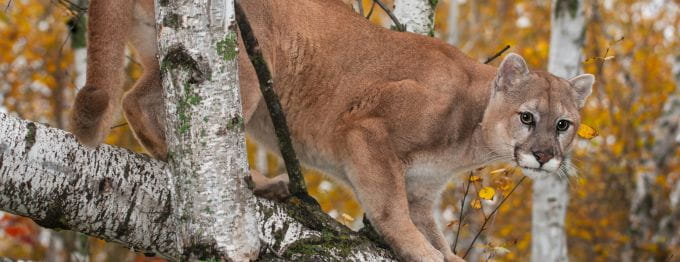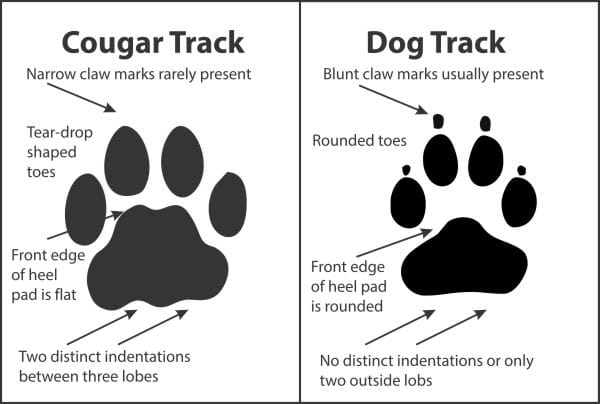
If you have an aggressive encounter with wildlife, and/or if public safety is at risk, call the Turn in Poachers and Polluters (TIPP) line at 1-800-667-7561 or report online.
Producers experiencing loss of livestock or commercial crops by wildlife can access the Saskatchewan Crop Insurance Corporation Wildlife Damage Compensation Program.
If you see a wild boar, contact a Saskatchewan Crop Insurance Office at 1-888-935-0000 or visit their wild boar website.
Cougars once ranged across the Prairies, but were displaced to more remote mountain regions as settlement advanced. Over the past two decades, they have been expanding their range eastward across Canada and are recolonizing much of their former range. There are recent confirmed reports from as far east as Missouri and Tennessee.
In Saskatchewan, cougars are a natural part of the landscape, especially in the Cypress Hills region. These animals are a sign of healthy ecosystems and sightings often go unreported.
While your chances of seeing a cougar are slim, people need to be aware of their existence. Although attacks on humans are rare, you need to practice caution and safety when outdoors in cougar country.
Remember that we share the land with these animals. These predators have a right to coexist with us when they are minding their own business.
If you encounter a cougar
- Make sure it knows you are not potential prey – do not run. Stand up, make yourself look big, shout loudly and throw something to distract the animal. Back away to a safe distance and maintain eye contact.
- If a cougar does make contact, fight back, use any weapon that you can and don't give up. Never play dead with a cougar. After the animal has left, keep watching for it until you reach safety.
- Cougars may view children as prey targets due to their small size and quick movements. In the event of a cougar encounter, pick up your children immediately.
If you live in cougar country
- Do not feed wildlife. Feeding wildlife can attract animals that may be prey for cougars, thus attracting cougars to your yard.
- Avoid feeding pets outside. Pet food can attract prey that cougars hunt.
- When possible, keep pets indoors at night; they are easy prey for cougars.
- Deer are prime prey for cougars and they will follow deer that hang around or live in a yardsite. Try to make your yard as deer proof as possible.
- Dense vegetation makes great hiding places for cougars. Remove vegetation that could be a hiding place, making your yard less friendly for cougars.
- Enclose the base around porches or decks and keep out-buildings closed – cougars will make use of these spaces to den or cache food.
- Outdoor lighting and motion-sensitive lighting is a deterrent. Lights also make approaching cougars more visible.
- Keep a close eye on your children when they are playing outside. Bring children in before dusk when cougars begin to hunt. Teach them what to do if they encounter a cougar.
Cougars and livestock
- There have been few confirmed cases of livestock killed by cougars in Saskatchewan. However, in Saskatchewan, landowners have the right to kill any predator, including cougars, on their own land if they feel an animal is posing a threat to their family, property or livestock.
- Landowners may also designate this authority to an immediate family member, employee or a licensed trapper.
- If a cougar is taken under this authority, the local conservation officer must be notified and will determine how best to dispose of the carcass.
- Assistance may also be available from predator control specialists on contract to the Saskatchewan Crop Insurance Corporation at 1-888-935-0000.
Cougar facts
- Cougars are the most evasive and secretive of all wildlife species in Saskatchewan, and generally travel in low light conditions to move or stalk their prey.
- Cougars are the largest feline of the three native cat species to Saskatchewan, the others being bobcat and lynx.
- The cougar's primary prey is deer. However, they are known to prey on livestock and pets. They will also feed on elk, rabbits, beaver, porcupines, raccoons and grouse.
- Cougars have large home ranges and males can travel more than 50 kilometres in one day.
- Cougars will generally give birth to two or three kittens.
- During late spring and summer, one to two-year old cougars become independent of their mothers. While attempting to find a home range, these young cougars may roam widely in search of unoccupied territory. This is when cougars are most likely to conflict with humans.

